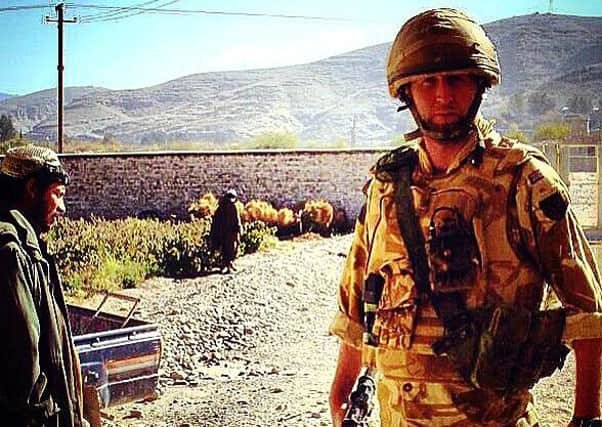Doug Beattie: We have more defence options as part of the European Union


Two hundred years ago Napoleon Bonaparte was defeated by a coalition at Waterloo.
A century later it was the Triple Entente of the UK, France and the Russian Empire who formed the core of the allies who stood against the Central Powers of Germany and Austria-Hungary.
Advertisement
Hide AdAdvertisement
Hide AdMuch more recently it was a disparate group of countries who took on the Taliban in the bloody and protracted campaign fought amongst the deserts, kalays and green zones of Afghanistan.
Armed coalitions tend to work. Created by ideology or the pragmatism needed to ward off a shared threat, they bring together military capabilities and capacity, uniting nations to achieve a common goal.
Yet the EU Referendum has cast a spotlight on what sort of collaboration the UK should engage in to ensure its security.
Some foresee an ever-more centralised EU where the inevitable result is a single European Army beyond our control.
Advertisement
Hide AdAdvertisement
Hide AdOthers fear that if we cast ourselves adrift from the EU then our military might will be diluted; our armed services relegated to an impotent defence force without call on others.
Yet more believe that it is our membership of NATO which offers us the greatest protection. And there is no doubt that the guarantor of peace in Europe since World War II has been the North Atlantic Treaty Organisation. But a clue to its limitations lies in the name.
Article 5 of the NATO treaty states an attack on one nation would be deemed as an attack on all nations in the alliance. Yet when the Falkland Islands were attacked by Argentina in 1982 NATO didn’t send ships to join the Task Force which set sail for the southern hemisphere.
The reason is simple enough; the Falklands lie far beyond the organisation’s geographical jurisdiction.
Advertisement
Hide AdAdvertisement
Hide AdIn the absence of access to this pan-national military might we had to look to old friends for assistance. Some were older than others. Portugal’s offer to the Royal Navy to use the facilities in the Azores was based on the Anglo-Portuguese Treaty which was first signed more than six hundred years ago in 1373.
And for all its power NATO can only impotently stand and watch when member nations start to bicker amongst themselves. The dispute over Cyprus is between two such countries: Greece and Turkey.
And what would happen if Spain ever carried out its veiled threats and annexed Gibraltar? NATO would shrug its shoulders and if the UK was outside the EU then it would once again have to look for other treaties of mutual obligation. The UK-France Defence Cooperation Treaty might be one – to assist in creating a bi- or multilateral response.
The argument from long retired senior military figures who say the UK military capability is being eroded by being part of the EU Common Defence Policy make little sense.
Advertisement
Hide AdAdvertisement
Hide AdThey argue the UK should concentrate on NATO - yet the majority of countries contributing to NATO are also members of the EU. Therefore if we carry this argument to its natural conclusion NATO is therefore less capable.
But what is the practical likelihood of a standing EU army? The logistical difficulties are legion and the political difficulties of getting 28 sovereign nations to agree an acceptable chain of command, let alone shared objectives, are formidable and probably insurmountable.
The day when French troops are stationed on Salisbury Plain and called out to help with civil contingencies such as firefighter strikes, flooding and foot and mouth is not a realistic option.
But if a fully-fledged EU Army is pie in the sky an EU Force is already a reality and has been for thirteen years. EUFOR, as it is known, has been deployed on five missions: Macedonia, Bosnia, Democratic Republic of the Congo, Chad and the Central African Republic. These operations were and are part of the EU Common Security and Defence Policy and it is up to member states to decide to what extent they will involve their own national forces. In this instance the UK would have a national veto on the deployment of British forces.
Advertisement
Hide AdAdvertisement
Hide AdLikewise EUROCORPS, a coalition of five nation member and five associated nation, has been operational since 1995 and does not include the UK. It has a 1,000 strong HQ element based in Strasbourg - at its heart is an Franco-German Brigade.
The picture I am trying to paint is one of multiple routes to mutual cooperation. Inside or outside the EU we face security challenges but whatever our political and sovereign status there will be options to work with others militarily. Indeed UK soldiers are used to it.
During the 34 years I spent in the army I rarely felt that I was acting in splendid isolation. More often than not I was working in a chain of command where people above and below me were of other nationalities.
Which is not to say that I do not have a view on whether our national security would be better maintained in the EU or out.
Advertisement
Hide AdAdvertisement
Hide AdOn balance I feel we have more options as part of the Union. It has been shown to work. Our support mechanism is already in place. It’s the proven option.
And why change something that isn’t broken - and it isn’t broken.
Captain Doug Beattie is Ulster Unionist MLA for Upper Bann